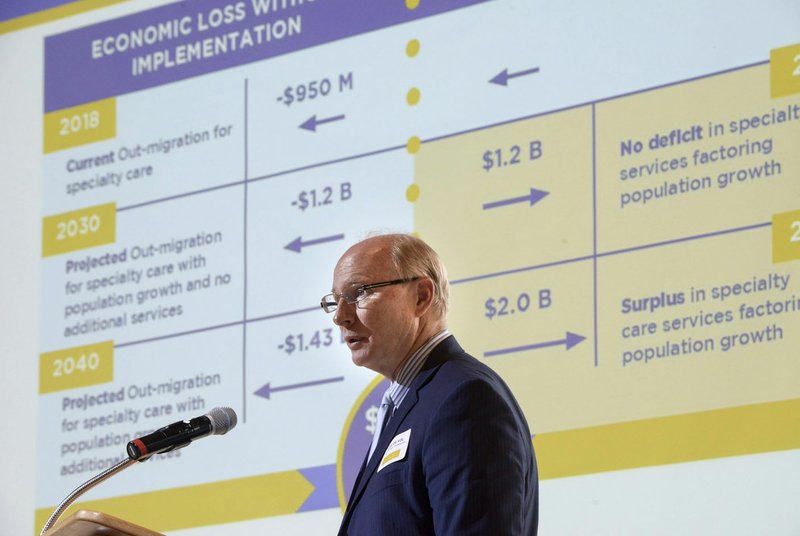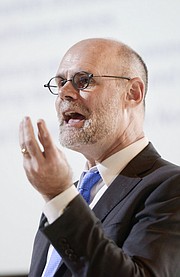BENTONVILLE -- Northwest Arkansas is missing out on $950 million in the health care economy, in part because of a lack of specialty health care providers, according to a report.
The report, released Thursday during the Northwest Arkansas Council's annual winter meeting, outlines four recommendations for how the region can attract and retain health care professionals and patients: establish a division of the council focused on health care transformation; expand graduate medical education; develop an interdisciplinary research institute; and develop a medical school.
The council, a nonprofit organization comprised of executives from the region's largest companies, schools and health care systems, hired consulting firm Tripp Umbach to begin researching the region's health care economy in March. A steering committee of hospital administrators, physicians, educators, entrepreneurs, nonprofit organization leaders, corporate executives and biotech company owners assisted the firm, according to a news release.
Nelson Peacock, the council's president and chief executive officer, said before Thursday's meeting expanding health care has been high on its list of regional priorities for about five years. The Northwest Arkansas Regional Airport and Interstate 49 are past projects the group has spearheaded.
Peacock told a crowd of about 125 community leaders the report serves as a map for how the region can become a health care destination, a place where people come for health care services. Thursday's meeting was at Crystal Bridges Museum of American Art in Bentonville.
Northwest Arkansas has more than the national average of doctors who specialize in family medicine and geriatrics based on population, but the region falls short in most specialty health care fields, including obstetrics/gynecology, internal medicine, hematology/oncology, cardio disease, endocrinology, neurology and psychiatry, according to the report. The report included Benton, Washington and Madison counties.
Paul Umbach, founder and president of Tripp Umbach, said the firm uses patient data.
"You are a patient. We know the ZIP code you come from. We know the ZIP code you go to. We know what happened there. We know how much you spent there. We also know how long you stayed there. And then, we can as economists conclude that people came and visited you there. They stayed in a hotel, spent money, and all of those dollars leaked out of Northwest Arkansas," Umbach said.
The report predicts if the recommendations are implemented, the region could have a surplus of $57 million in the health care economy by 2040.
The council's first step is to hire a staff member for the transformation division by July 1.
"Recognizing that no single organization has the resources required to maximize economic development potential, an umbrella organization should be utilized to coordinate regional focus areas related to health care sector economic development," according to the report.
Umbach said the region's health care is high quality and low cost compared to similar markets. The population is also generally healthier than the rest of the state, he said. However, people aren't traveling in large numbers to Northwest Arkansas for medical treatment, and the training opportunities for new doctors are limited.
Benton and Washington counties ranked first and second, respectively, in overall health in all of the state's counties, according to the 2018 County Health Rankings by the Robert Wood Johnson Foundation. Madison County ranked 34th. Arkansas, meanwhile, ranked 46th last year in the United Health Foundation's annual health rankings.
Not only do people not travel to Northwest Arkansas for specialty care, but patients who live in the region often travel to cities such as Houston or St. Louis for specialty care treatment, Umbach said before his presentation.
The report states expanding graduate medical education is a priority for the next couple of years, while developing an interdisciplinary research institute and possibly developing a medical school are more long-term goals.
At least 200 new residency positions should be established and an interdisciplinary research institute created to focus on quality, access and cost-effective care. The recommendation suggests the University of Arkansas, the University of Arkansas for Medical Sciences and health care providers collaborate on the project.
Federal law caps financial support for residency slots to the number a facility had in 1996. Medicare reimbursement covers much of the direct and indirect cost of employing and training new and inexperienced doctors, providing supervising physicians and other education needs.
No more federal money will pay for residencies because the area has met its cap, but the area needs more residencies to keep up with its population growth, Peacock said.
"We have to come together and figure out strategies for how we're going to fund that," he said. "That might be through private sector philanthropy. That might be contributions from health care providers."
The council's role will be to bring leadership together and develop plans to bring in more graduate medical education, Peacock said.
Susan Barrett, retired CEO of Mercy Health System, said the real task is to get more residencies in Northwest Arkansas and the answer as to how to do so should come in the next step after the council establishes the new division.
Barrett was on the steering committee meeting with Tripp Umbach and council staff.
"Physicians often stay wherever they do their residencies, so if there's no residencies for specialty physicians in Northwest Arkansas, we are not even in the pool," she said.
The Association of American Medical Colleges reports 59 percent of medical undergraduates from the state's medical school, the University of Arkansas for Medical Sciences, stay in state. The national average for retaining these graduates is 39 percent.
"If you look at the larger geographic region, there are going to be a number of medical school graduates that are going to be coming out looking for residency slots. We don't have those residency slots in Northwest Arkansas, and they will go somewhere else," she said.
A report released by the Northwest Arkansas Council listed the following findings concerning the region’s healthcare economy:
• Without a healthcare-focused regional strategy, the underperformance of the healthcare sector will negatively impact future health status, economic development, and Northwest Arkansas’ population growth.
• Changing demographics and population growth are impacting current capacity to provide healthcare services while the healthcare industry nationally and regionally is experiencing dramatic transformation.
• Compared to peer markets, Northwest Arkansas has relatively high-quality and low-cost healthcare services.
• Improved connectivity among employers, community health initiatives and healthcare providers is important to achieving long-term economic and social outcomes.
• Limited graduate medical education in Northwest Arkansas holds back needed healthcare sector expansion.
Source: Staff Report
NW News on 01/18/2019




